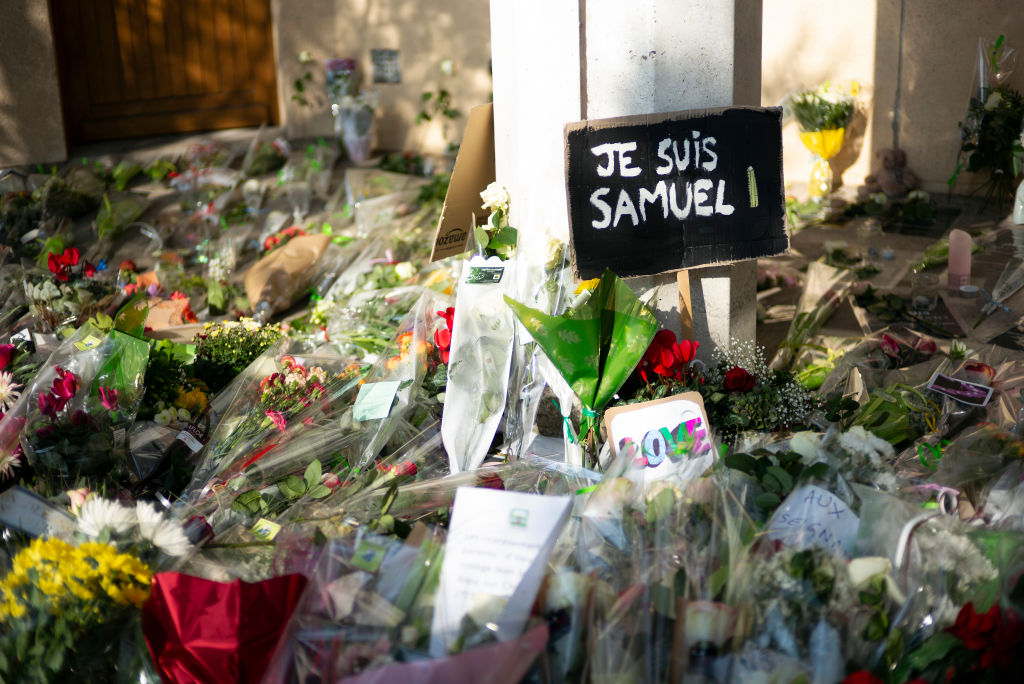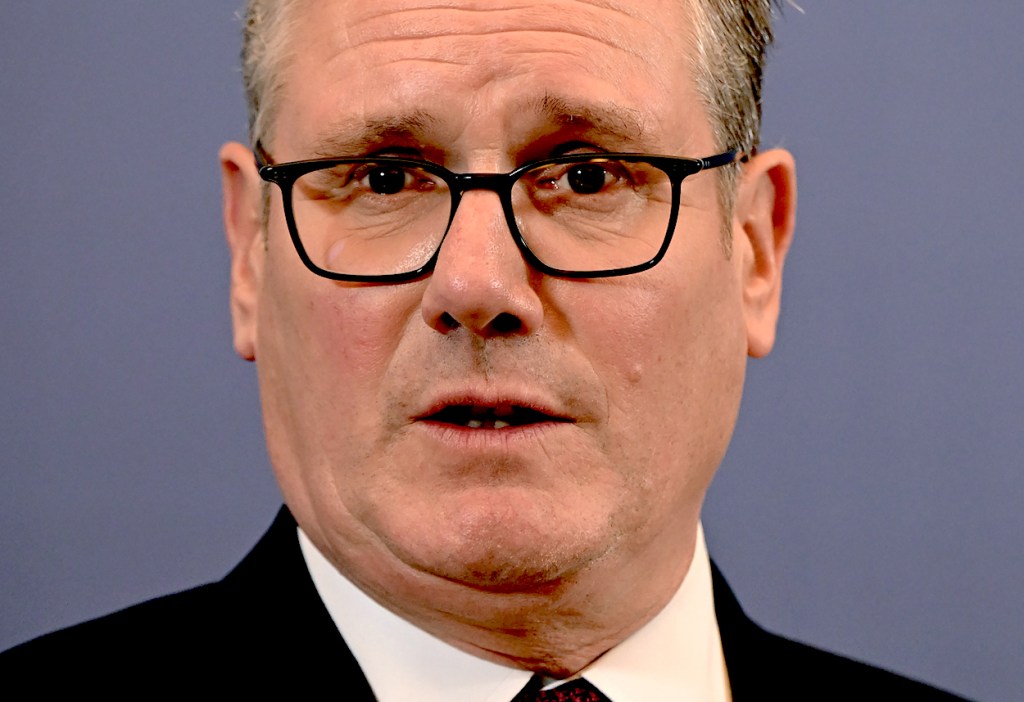The debate over an official definition of Islamophobia is reaching a crescendo – with Dominic Grieve’s proposed definition in the hands of Communities Secretary Steve Reed. Yet perhaps the most important aspect of this bubbling controversy has been strangely undercooked to date.
The chilling effects on free speech of Islamist-inspired ‘cancel culture’ are now well understood. But the potential lethality – literally so – of an accusation of ‘Islamophobia’ has been accorded too little attention.
The potential lethality – literally so – of an accusation of ‘Islamophobia’ has been accorded too little attention
In France last week, ceremonies were held to commemorate the fifth anniversary of the murder of Samuel Paty – the French history and geography teacher beheaded outside his middle school at Conflans-Sainte-Honorine near Paris by a Chechen of Russian nationality, who then proudly held up Paty’s head for an online photograph, before being shot dead by the police.
Paty had first been fingered in an online campaign launched by a father of one of the students at the school – for showing cartoons of Muhammad during the course of an officially-sanctioned citizenship class, taught as part of the French equivalent of the national curriculum. It centred on the issues at stake in the Charlie Hebdo killings of 2015 and was entitled ‘Dilemma Situation: To be or not to be Charlie?’
The details of the last ten days of Paty’s life are brilliantly recounted in a play – Le Professeur – that had its first outing on the mainstream Parisian stage at the Theatre La Scala earlier this month; all the parts were read by Carole Bouquet, the former Bond girl and one-time consort of Gerard Depardieu.
It was penned by Émilie Frèche – a prominent writer who also co-authored Le Cours de Monsieur Paty with Mickaëlle Paty, sister of the slain schoolmaster. The play portrays systemic failure: an increasingly lonely and terrified teacher who was suffering a campaign of demonisation which led to his assassination. Indeed, pupils were paid money by the killer to point out Paty as he left his workplace.
So despite the mass defiance and solidarity of France’s ‘Je suis Charlie’ moment of 2015 after the murders of the Charlie Hebdo staff, with the largest ever demonstrations in the country, fewer people than expected turned out to be ‘Charlie’ in practice.
To Mickaëlle Paty, a key issue at the heart of her brother’s killing is the concept of ‘Islamophobia’: ‘Islamophobia is a concept that places a target on people’s backs,’ she tells me. ‘It looks innocuous like “anti-discrimination”, but actually it’s like the first flap of a butterfly’s wing that creates a tornado that then destroys all before it.’
She rejects the idea that the killing of her brother can be dismissed as a ‘one-off’ perpetrated by Isis (which the murderer of her brother had links to). Witness the case of Dominique Bernard, another teacher murdered by a former pupil of his school in Arras in 2023.
One of the hardest aspects of her ordeal was preparing for the criminal trial – but nothing equipped her for being ‘eyeballed’ in true gangland fashion by some of the suspects who were later sentenced for their parts in the wider conspiracy to take her brother’s life. The full story of these hearings will be told in Émilie Frèche’s next book Un Séisme – illustrated by the author’s own vivid courtroom sketches.
But to her, the proceedings are about something even bigger. ‘This was the trial of trials about Islamophobia’, she comments. She contends that the concept of ‘Islamophobia’, a doctrine propagated by the Muslim Brotherhood to set the terms of legitimate discourse in the public space, was the real killer here – not just of her brother but potentially of the tenets of a whole free society.
In Mickaëlle Paty’s view, the key players were those who ‘weaponised’ the concept of Islamophobia. First, the father of the 13-year-old girl who falsely complained that Muslim pupils had been ordered to leave the lesson when the images of Mohammed were being shown – when his daughter was not even in the classroom that day. One of the father’s key gripes with Paty was that the teacher had gone on the ‘je suis Charlie’ march back in 2015.
But the key player for Mickaëlle was the Islamist activist and Hamas supporter Abdelhakim Sefrioui (the head of the Sheikh Ahmed Yassin Collective, named for the founder of Hamas) who purported to speak for the Imams of France. He took the pupil’s grievance to a new, nationwide level – helping to stage the campaign about the humiliation she claimed falsely to have suffered in the classroom.
Employing the themes of classic Islamist grievance culture, Sefrioui compared the situation to Srebrenica, where the Serbs massacred 8,000 Bosnian Muslims in 1995. And when Sefrioui initially turned up at the school with the father of the pupil, demanding that Paty be sacked, he claimed that he was forced to wait outside in the cold – and that had he been Jewish, he would not have been treated in that way.
In the courtroom, nothing was sacred to the perpetrators and, for Mickaëlle Paty, this was among the lowest moments of the trial: Sefrioui likened his activities to those of the French Resistance. ‘No – don’t you touch Jean Moulin!’ she exclaimed. ‘It’s to dirty our national heroes.’
The court found that Sefrioui had played an essential role in the causal chain leading to the killing by designating Paty as a target – even if he had not intended that particular outcome – and sentenced him to 15 years in prison.
What has been the effect of all this? In the days after the killing, a defiant slogan at one of the demonstrations read ‘L’école pleure, mais n’a pas peur’ (the school cries, but is not afraid). But this was invalidated by the evidence: as Paty and Émilie Frèche note in their book, a survey found that 35 per cent of French teachers avoid or hesitate to report violations of the foundational French Republican concept of laicité in their schools.
It is the curricular effects, she says, which are the most serious aspect of the Muslim Brotherhood’s drive for the ‘Islamisation’ of knowledge: she notes that the teaching of music, art and literature has become very challenging in certain parts of France.
Indeed, one schoolmaster – writing of his classroom experiences in Le Nouvel Observateur last year – recalled that some of his Muslim pupils, entirely sincerely, wished that Flaubert had lost his 1857 trial for outraging public decency with Madame Bovary. Another student threatened to report him to her father for teaching the scene where Romeo and Juliet kiss. Even aspects of mathematics, Mickaëlle Paty notes, has become contentious in some schools.
These emerging trends featured as far back as 2004 in the groundbreaking report by Jean-Pierre Obin, then national inspector for education, ‘Comment on a laissé l’islamisme pénétrer l’école’(How Islamism was allowed to penetrate schools). But Paty notes that in the intervening years, the potency of Islamophobia as an allegation has conditioned officialdom into not taking action.
Hard as it was for Mickaëlle Paty to relive the horror during the trial, she at least had the satisfaction of seeing the circle of eight conspirators sentenced – in other words, a wider group than just the deceased perpetrator of the attack himself (though an appeal is set for four of them in 2026).
The ‘masterclass’ in Islamophobia she witnessed during the legal proceedings constitute part of a wider appraisal of Islamophobia as a threat to the institutions of the Republic. The most important such document is the recent official report on the Muslim Brotherhood – one of the most significant policy legacies of the recently departed Interior Minister, Bruno Retailleau.
Indeed, on the basis of past pronouncements, it seems hard to imagine his successor, Laurent Nunez – a former coordinator of the National Centre of Intelligence and Counter-Terrorism – will tolerate religious law taking precedence over those of the Republic.
The Interior Ministry’s review made much of the concept of Islamophobia in Muslim Brotherhood circles and further noted the salient part played by the Collectif Contre l’Islamophobie en France (CCIF) – which pre-emptively dissolved itself before it was formally wound up by decree by Macron in the wake of the killing of Samuel Paty.
The decree noted that the CCIF had helped to create a breeding ground for acts of violence by denouncing state counter-terrorism measures as Islamophobic; and, amongst other acts of omission, that it had failed adequately to condemn the murder of Paty. However, it swiftly reconstituted itself in Belgium as the Collectif Contre l’Islamophobie en Europe (CCIE).
At the same time, to the continuing amazement of French officials, the British authorities show little interest in the activities of Muslim Brotherhood-aligned entities; when it comes to non-state threats, they remain almost exclusively focused on violent extremism.
Will an official definition of Islamophobia make such violence more or less likely on these shores? The latest word in Whitehall is that despite some widely-advertised initial doubts from the new ministerial team at MHCLG, a non-legally binding definition of anti-Muslim hatred of sorts will become government policy – so that Muslim representatives feel that their community enjoys some parity with the standard International Holocaust Remembrance Alliance (IHRA) criteria for anti-Semitism.
But the fate of Samuel Paty points to the relative risks with an Islamophobia definition. If the Chief Rabbi or the President of the Board of Deputies calls out Jeremy Corbyn for behaviours that violate the IHRA conception of anti-Semitism, does anyone seriously suppose that some toughs from Golders Green will go and behead the leader of Your Party in order to ‘put manners’ on the anti-Zionist hard left? That’s why there are times in the forging of public policy when sauce for the goose simply isn’t sauce for the gander.
Dean Godson is Director of Policy Exchange and a member of the House of Lords. Policy Exchange’s new Islamophobia Definition Observatory can be found here.







Comments